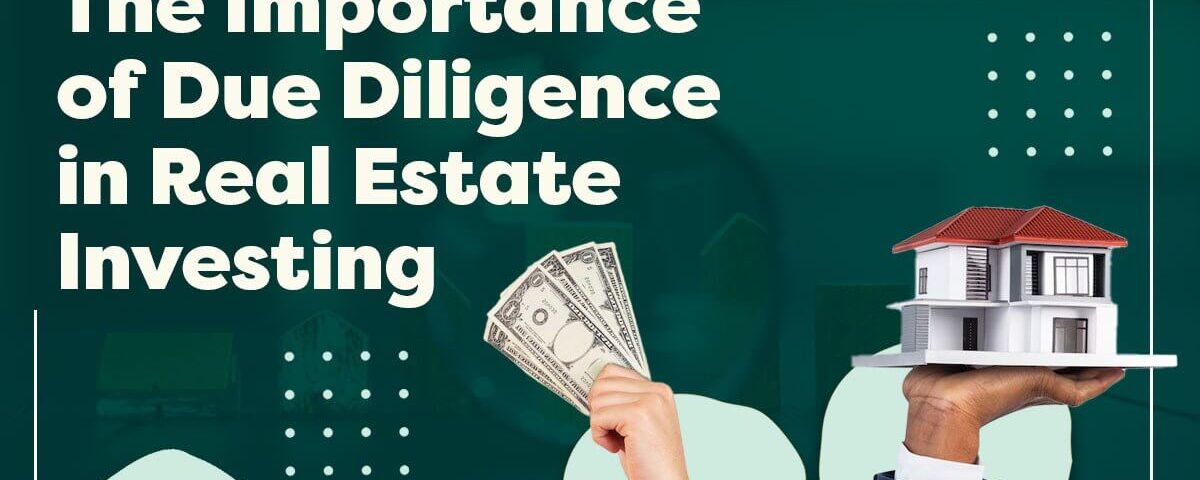The Importance of Due Diligence in Real Estate Investing

Private Lenders Vs. Banks – Which is Right For Your Project?
December 18, 2023
Emerging Markets and Real Estate, Is it Worthwhile Venture?
December 23, 2023From a rookie real estate investor to seasoned veterans, one concept remains paramount: due diligence. Due diligence embodies a regimen of processes and investigations a prudent real estate investor engages in before signing a contract or closing a deal. It’s a safety net that can protect you from unforeseen issues, unexpected costs, and unfavorable market conditions. This blog delves into the importance of due diligence in the complex world of real estate investing.
Due Diligence: A Crucial Step to Success
Due diligence in real estate can equate to a compass in a vast ocean. It helps navigate the rough seas of regulations, market trends, property conditions, and a myriad of other factors that can impact an investment’s profitability.
Legal Protection
The first guard of due diligence shields investors from legal pitfalls. It involves performing a thorough title search, checking for liens or claims on the property, and confirming the legality of constructions and modifications. Ignoring this step can lead to legal entanglements that are costly and time-consuming to unravel.
Financial Feasibility
Another key aspect of due diligence lies within financial analysis. Here, investors appraise the property’s projected income, anticipated expenses (including taxes), and potential profitability. They may also consider aspects such as the property’s location, overall market conditions, and potential growth in the area.
Property Inspection
A comprehensive property inspection is another critical element of due diligence. It uncovers hidden repair needs or structural issues that might not be apparent during a casual visit. Discerning such problems beforehand allows investors to anticipate additional costs, or even negotiate a lower price.
Understanding Market Trends
Investors must also understand broader market trends and how they might affect a potential investment. This includes the economic outlook, real estate market conditions, and even global events that might influence property values and rental yields.
Encountering Roadblocks with Due Diligence
As vital as due diligence is, it’s not devoid of challenges. It often requires a significant time investment and potentially even financial investment. You also need to possess or acquire a certain level of knowledge and expertise to conduct effective due diligence. Even then, you may come across unclear data or undisclosed information, presenting additional hurdles to clear decision-making.
Despite these potential obstacles, the risk of bypassing due diligence can far outweigh its challenges. The repercussions of stepping into a deal without a comprehensive understanding can yield disastrous financial outcomes.
Transforming Due Diligence in Real Estate Investing
Technology has revolutionized almost every industry, and real estate investing is no exception. Real estate investors now have access to an array of tools and platforms that can aid and enhance the due diligence process, giving them insights and reducing the legwork required. Here, we explore how technology aids in conducting effective due diligence, with a focus on data analytics and digital resources. Dowload Belwood APP here for more details
Turning Raw Data into Profitable Insight
Data is a game-changer for today’s real estate investors. With enormous amounts of data available through multiple channels, the challenge is making sense of it all – and that’s where data analytics comes in.
Machine Learning and Predictive Analytics
Machine learning and AI-driven predictive analytics provide a powerful tool to process, analyze, and interpret complex data. They simulate potential scenarios, offering forecasts regarding property values, rental yield, and regional growth trends.
Moreover, predictive analytics can assess risk factors associated with a particular investment, considering variables like market volatility, neighborhood demographics, and economic indicators. In essence, it offers a risk-assessment tool, invaluable in the due diligence process. Dowload Belwood APP here for more details

Streamlining the Due Diligence Process
The internet provides a trove of digital resources that can augment the traditional due diligence process.
Information Gathering
Several online databases and property portals offer a wealth of information for potential investors. From property history, ownership details, and neighborhood statistics, to planning consents, investors can find most of the data they need online.
Virtual Property Visits
Technological advancements such as 3D virtual tours allow prospective investors to ‘visit’ properties without stepping foot inside them. This could be invaluable when purchasing overseas properties or when investors are short on time.
Digital Documentation and Records
Blockchain and other digital ledger technologies enable easier and safer record-keeping. They can securely store property deeds, transaction details, and other legal documents, speeding up verification processes and enhancing transparency. They also reduce the risk of document fraud and other legal complications.
Geospatial Analysis
Geospatial mapping and analysis tools offer investors a visual way to assess the location of a property and its proximity to key amenities. These tools can provide insight into trends in neighborhood development and economic activity.
Technology: An Aid, Not a Substitute
While technology can streamline and enhance the due diligence process significantly, it’s important to remember that it’s an aid, not a substitute for thorough due diligence. Nothing can completely replace a detailed on-site property visit or a careful reading of legal and financial documents. Dowload Belwood APP here for more details
Embrace Due Diligence for Informed Investing
In essence, due diligence serves to validate an investment and protect investors from unseen risks. It fosters informed decision-making and bolsters investment resilience against market fluctuations.
Remember, every stone unturned during due diligence could hide a pitfall that impacts your investment negatively. So, arm yourself with information, confirm facts, and engage professionals whenever necessary.
In real estate investing, your due diligence can be the sword that cuts through doubt and shields you from potential loss, propelling you toward a more successful investment portfolio. Make it your trusted partner on your real estate investing journey. Call: +1 916-990-3010
